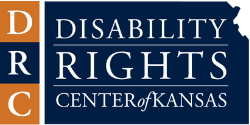Disability & Aging Crime Victims Unit
Are you a Kansan with a disability who has been the victim of a crime? Or: Have you been the victim of elder abuse, neglect, or exploitation? We may be able to help you with your civil legal matter. Contact us to find out how we can help.
We help Kansans with disabilities or Kansas seniors who have been victims of crime. Our services are at no cost.
Information & Referral: We can give you information about the justice system and your rights as a crime victim. If we can't help you, we will try to find someone who can.
Rehousing Assistance: We have funding to support certain rent, utility, and other expenses needed to rehouse people with disabilities and seniors who are crime victims. This support is for situations where the crime made your home unsafe, and you still don't have a safe place to live. Learn more here.
Civil Legal Representation: If you need help with a civil legal matter, we might be able to help you.
Personal Advocacy: We may be able to help you get what you need by advocating on your behalf.
Navigating the Justice System: We can help you in the justice system, with things like:
- Your victim's impact statement
- Getting back money that you lost because of the crime
The services that we provide depend on the facts, the law, and how to achieve the best outcome for you.
Our Disability and Aging Crime Victims Unit may:
- Help you understand your rights
- Help you with your goals after the crime
- Help you with your civil legal matter
Check out some client stories to better understand how we can help.
*NOTE: All names and some details in the examples have been changed to protect the confidentiality of our clients.





This grant project is supported by subgrant number 24-VOCA-56 awarded through the Federal Office for Victims of Crime as administered by the Kansas Governor’s Grants Program. The opinions, findings, conclusions, or recommendations expressed in this publication, program, or exhibition are those of the author(s) and do not necessarily reflect the views of the Office of the Kansas Governor or the U.S. Department of Justice.
.png)






